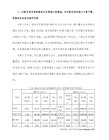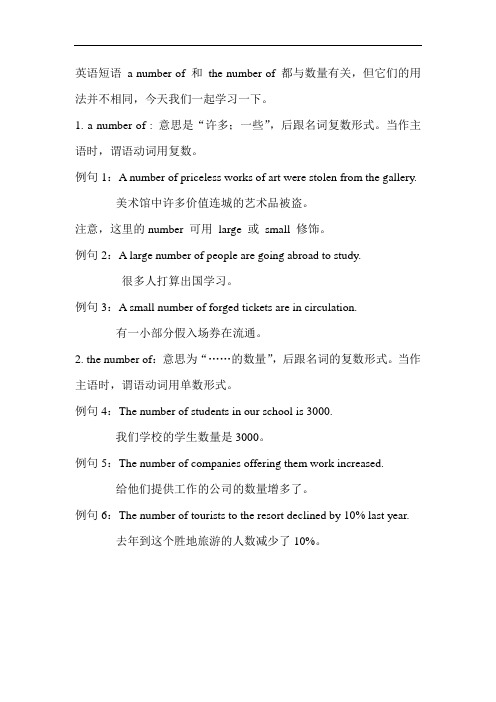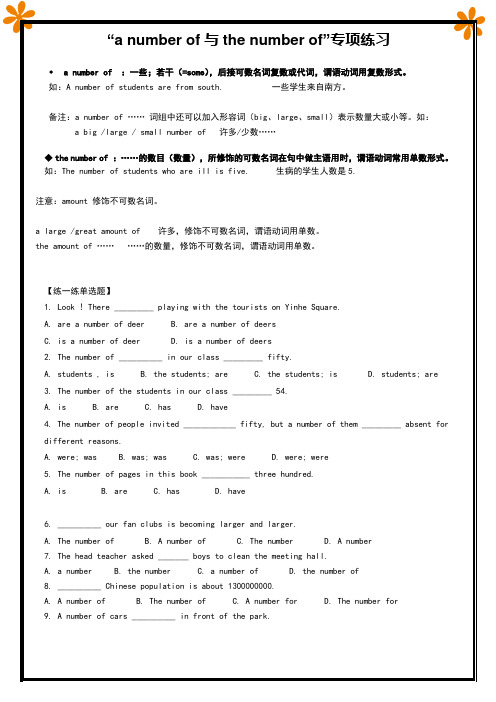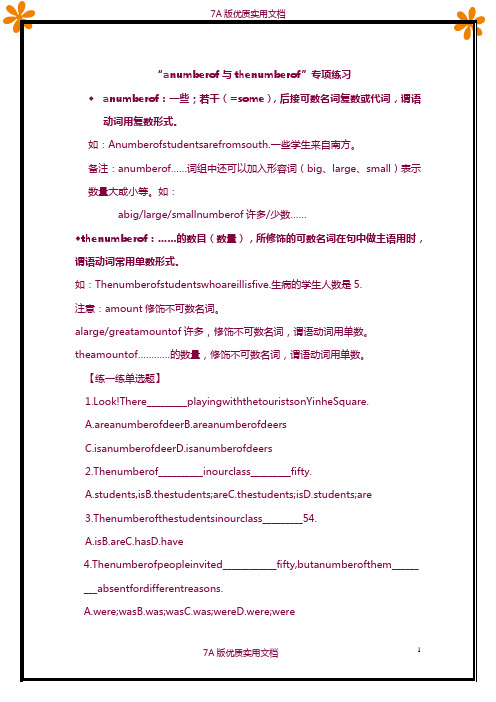the number of 与a number of 的区别
- 格式:doc
- 大小:11.00 KB
- 文档页数:1

the number of修饰的先行词
(1)a number of
意为“许多,大量”,后加可数名词复数。
作主语时,谓语动词用复数。
意为“......的数量”,后提可数名词复数。
并作主语时,谓语动词用单数。
2a number of用法
润色可数名词,就像是some,many,lots of,a lot of那样的.特别注意a number of
润色的.可数名词必须用复数形式,be动词也必须用复数(即are,具体内容因时态而的
定)!
e.g.a large number of students are ill these days because of the swine flu.
这些天我们班的许多学生都因为猪流感而病了.(译者系则本人友情提供更多!)
修饰了名词之后be动词要用单数,因为(从中文意思方面理解)数量就是一个数字,
所以必须要用单数(即is,具体因时态而定).
e.g.the number of the students in our class is 53.
我们班学生的人数(即数量)是53.。


英语短语a number of 和the number of 都与数量有关,但它们的用法并不相同,今天我们一起学习一下。
1. a number of : 意思是“许多;一些”,后跟名词复数形式。
当作主语时,谓语动词用复数。
例句1:A number of priceless works of art were stolen from the gallery.
美术馆中许多价值连城的艺术品被盗。
注意,这里的number 可用large 或small 修饰。
例句2:A large number of people are going abroad to study.
很多人打算出国学习。
例句3:A small number of forged tickets are in circulation.
有一小部分假入场券在流通。
2. the number of:意思为“……的数量”,后跟名词的复数形式。
当作主语时,谓语动词用单数形式。
例句4:The number of students in our school is 3000.
我们学校的学生数量是3000。
例句5:The number of companies offering them work increased.
给他们提供工作的公司的数量增多了。
例句6:The number of tourists to the resort declined by 10% last year.
去年到这个胜地旅游的人数减少了10%。
![[精品优选]A number of与the number of专项练习.doc](https://img.taocdn.com/s1/m/732f84d29b89680203d825e9.png)

“a number of与the number of”专项练习◆ a number of :一些;若干(=some),后接可数名词复数或代词,谓语动词用复数形式。
如:A number of students are from south. 一些学生来自南方。
备注:a number of ……词组中还可以加入形容词(big、large、small)表示数量大或小等。
如:a big /large / small number of 许多/少数……◆the number of :……的数目(数量),所修饰的可数名词在句中做主语用时,谓语动词常用单数形式。
如:The number of students who are ill is five. 生病的学生人数是5.注意:amount 修饰不可数名词。
a large /great amount of 许多,修饰不可数名词,谓语动词用单数。
the amount of …………的数量,修饰不可数名词,谓语动词用单数。
【练一练单选题】1. Look ! There _________ playing with the tourists on Yinhe Square.A. are a number of deerB. are a number of deersC. is a number of deerD. is a number of deers2. The number of __________ in our class _________ fifty.A. students , isB. the students; areC. the students; isD. students; are3. The number of the students in our class _________ 54.A. isB. areC. hasD. have4. The number of people invited ____________ fifty, but a number of them _________ absent fordifferent reasons.A. were; wasB. was; wasC. was; wereD. were; were5. The number of pages in this book ___________ three hundred.A. isB. areC. hasD. have6. __________ our fan clubs is becoming larger and larger.A. The number ofB. A number ofC. The numberD. A number7. The head teacher asked _______ boys to clean the meeting hall.A. a numberB. the numberC. a number ofD. the number of8. __________ Chinese population is about 1300000000.A. A number ofB. The number ofC. A number forD. The number for9. A number of cars __________ in front of the park.A. is parkedB. was parkedC. are parkedD. has parked10. The number of articles published on smoking ______________ amazing.A. isB. areC. wereD. have been11. The number of the students in this school _________________ four hundred.A. isB. areC. hasD. have12. Can you make sure of __________ the visitors right now ?A. a number ofB. the number ofC. an amount ofD. the amount of13. The number of the students in our school _____ about 3, 000 and a number of them _____ fromthe countryside.A. is; isB. is; areC. are; isD. was; were14. --- What the number of the students __________ in your school ?--- About two thousand. A number of them ____________ from England.A. is; areB. is; isC. are; isD. are; are15. It’s reported that a large numbe of people _____________ been killed and the number ________ added up to nearly 70000.A. has; hasB. have; haveC. has; haveD. have; has16. As a result of destroying the forests, _________ a large _________ of desert __________ covered the land.A. number, hasB. quantity, hasC. number, haveD. quantity, have17. ___________ new products have been successfully made in the factory.A. A great deal ofB. A number ofC.The number ofD. A great amount of18. _____________ people gather there, talking about the film about Comrade Lei Feng.A. A great deal ofB. The large amount ofC. The number ofD.A great many19. _____ visitors to the UK were asked by newspaper reporters what their impressions of the British people were.A.The number of B.A number of C.Numbers of D.Any numbers of【翻译题】1. 我们学校老师的数量是150人。

thenumberof和anumberof的用法thenumberof和anumberof是一对相似又不尽相同的词组,两者都可以用来表示确切数量或大概数量。
虽然它们都可以同义代替,但也存在一定的差别。
本文旨在通过比较两者的用法来帮助读者更好地理解它们。
首先,要搞清楚thenumberof和anumberof的区别,需要从它们的特点入手,thenumberof表示的是特定的数量,比如“the number of books(书的数量)”,“the number of students(学生的数量)”或“the number of cars(车的数量)”;而anumberof则表示的是不太精确或未知的数量,比如“a number of books(一些书)”,“a number of students(一些学生)”以及“a number of cars(一些车)”。
因此,thenumberof用于表示具体的、可以被严格计算的数字时,应当使用具体数量,比如“there are three books”,“there are five students”及“there are eight cars”;而anumberof则适用于表达不太精确的数量,比如“there are a few books”,“there are a few students”及“there are a few cars”。
此外,thenumberof也常用于质数的表达,比如“the number of prime numbers(质数的数量)”,“the number of odd numbers(奇数的数量)”,“the number of even numbers(偶数的数量)”等等。
是因为thenumberof使用起来更清晰,更容易理解。
然而,anumberof也有它的优势,尤其是当我们想暗示一组具体数量时。
比如,“a number of books(一些书)”可以暗示存在一定数量的书,但不一定能够精确表征数量。
1、a number of, the number ofa number of +可数名词,谓语用复数,意为许多,大量的……the number of +可数名词,谓语用单数,意为……的数目2、able, capable, competentAble 指做某事所需的力量,技巧,知识与时间等,搭配是be able to do s.th capable 指满足一般要求的能力,搭配是be capable of +doingcompetent 指“胜任”,“合格”,或受过专业技术等训练的,不是超群的能力3、above all;after all;at all; in allabove all 意为“首先”、“最重要的是”,after all 意为“毕竟”、“到底”,at all 用于否定句时,意为“丝毫;根本”用于疑问句时,意为“究竟;到底”用于条件句时,意为“当真;实在”用于肯定句中,意为“竟然”in all 意为“总共”,4、aboard, abroad, board, broada board 介词,在船(或飞机,车)上a broad 副词,在国外或海外board 动词,上(船,飞机,车)broad 形容词,宽广的5、accept, receiveaccept 接受receive 收到如:I received an invitation yesterday, but I didn’t accept it.(昨天我收到了一个请柬,但并没有接受邀请。
)6、accident, incident, eventAccident 事故。
如:a traffic accident (交通事故)Incident “附带事件”,在政治上特指引起国际争端或战争的事件,事变。
event “事件”,指特别重要的大事件,通常是由以前的努力而产生的结果,也指国家和社会的事件。
7、accurate, correct, exact, preciseAccurate 准确的,精确的Correct “正确的”,含有“无错误的”意味。
a number of…和the number of
1) a number of…
a number of…意思是“一些,若干”(= some),后接可数名词复数或代词,谓语动词用复数形式。
a number of…词组中还可以加入形容词表示数量大或小等(例如:a large/small number of…许多/少数……)。
2) 注意和the number of的区别。
the number of…意思是“……的数字/数目”,介词of同其后名词构成介词短语,修饰the number.当它作主语时,谓语动词用单数。
例如:
Many people took part in 10,000-metre race, but only a number of them kept on running to the end. 许多人参加了10000米跑,但只有一些人坚持跑到底。
A number of my friends think I should take a holiday.
我的一些朋友认为我应该休假。
The number of students is about twenty.
学生人数大约是20人左右。